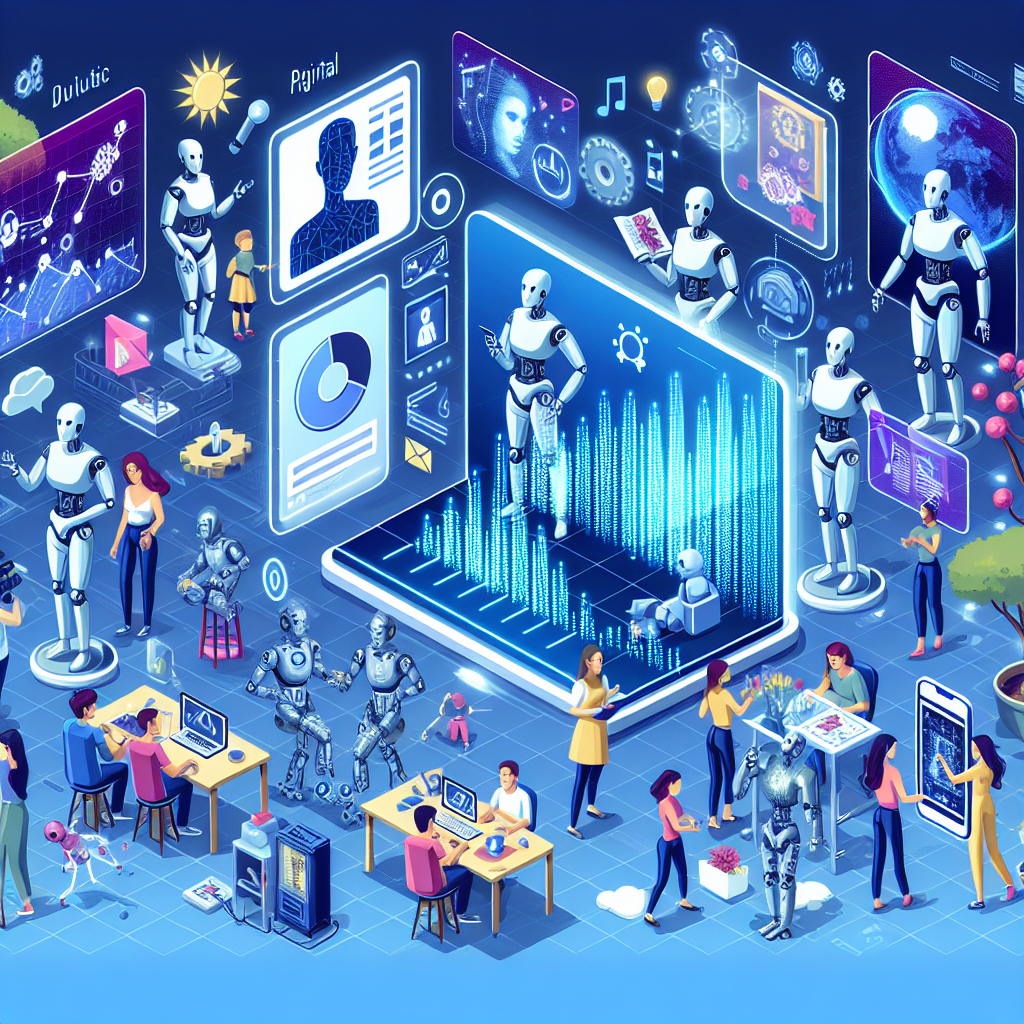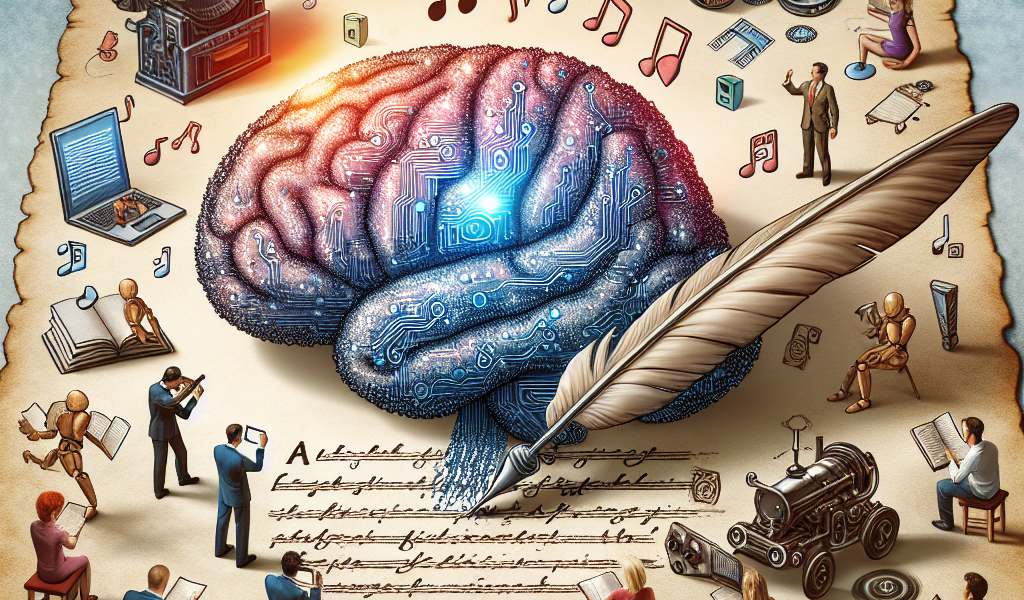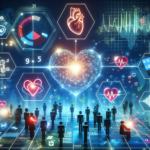-
Table of Contents
“Unleashing Creativity: How AI Transforms Content Creation”
Introduction

Artificial Intelligence (AI) is fundamentally transforming the landscape of content creation, offering unprecedented capabilities and efficiencies. By leveraging advanced algorithms and machine learning techniques, AI can generate, curate, and optimize content with remarkable speed and accuracy. From automated news articles and personalized marketing copy to sophisticated image and video editing, AI tools are enabling creators to produce high-quality content at scale. This revolution is not only enhancing productivity but also opening up new creative possibilities, allowing for more personalized and engaging experiences for audiences. As AI continues to evolve, its impact on content creation is set to grow, driving innovation and reshaping the way we produce and consume media.
Enhancing Creativity: How AI Tools Are Empowering Writers and Artists
Artificial intelligence (AI) is no longer a futuristic concept confined to the realms of science fiction. Today, it is a transformative force reshaping various industries, including content creation. Writers and artists, who once relied solely on their innate creativity and traditional tools, are now embracing AI to enhance their work. This technological revolution is not about replacing human creativity but augmenting it, providing new avenues for expression and efficiency.
One of the most significant ways AI is empowering writers is through advanced language models. These models, such as OpenAI’s GPT-3, can generate coherent and contextually relevant text based on a few prompts. For instance, a writer struggling with writer’s block can input a brief idea and receive a well-structured paragraph in return. This capability not only saves time but also sparks new ideas, allowing writers to explore different narrative directions they might not have considered otherwise. Moreover, AI tools can assist in editing and proofreading, ensuring that the final piece is polished and free of errors.
Transitioning from the written word to visual arts, AI is making waves in the world of digital art and design. Artists can now use AI-powered software to create intricate designs and animations with ease. These tools can analyze an artist’s style and generate new pieces that maintain the original aesthetic while introducing innovative elements. For example, an artist can upload a series of sketches, and the AI can produce a fully rendered image, complete with shading and color. This not only speeds up the creative process but also opens up new possibilities for artistic exploration.
Furthermore, AI is democratizing content creation by making sophisticated tools accessible to a broader audience. Previously, high-quality content creation required expensive software and extensive training. Now, AI-driven platforms offer user-friendly interfaces that allow even novices to produce professional-grade work. This democratization is fostering a more inclusive creative community, where diverse voices and perspectives can flourish.
In addition to enhancing individual creativity, AI is also facilitating collaboration among creators. AI-powered platforms can analyze and integrate different styles and ideas, enabling seamless collaboration between writers, artists, and other creatives. For instance, a writer and an illustrator working on a graphic novel can use AI to synchronize their efforts, ensuring that the text and visuals complement each other perfectly. This collaborative synergy results in richer, more cohesive content.
However, the integration of AI in content creation is not without its challenges. Concerns about originality and authenticity are prevalent, as some fear that AI-generated content may lack the unique touch that comes from human experience and emotion. Additionally, there are ethical considerations regarding the use of AI in creative fields, such as the potential for plagiarism and the impact on job opportunities for human creators. Addressing these concerns requires a balanced approach, where AI is used as a tool to enhance human creativity rather than replace it.
In conclusion, AI is revolutionizing content creation by empowering writers and artists with innovative tools that enhance their creativity and efficiency. From generating text and editing to creating digital art and facilitating collaboration, AI is opening up new possibilities for creative expression. While challenges and ethical considerations remain, the potential benefits of AI in content creation are undeniable. As technology continues to evolve, it will be fascinating to see how AI further transforms the creative landscape, enabling artists and writers to push the boundaries of their craft.
Streamlining Workflow: The Role of AI in Automating Content Production
In the ever-evolving landscape of digital media, artificial intelligence (AI) is emerging as a game-changer, particularly in the realm of content creation. As businesses and individuals strive to produce high-quality content at an unprecedented pace, AI is stepping in to streamline workflows and automate various aspects of content production. This technological advancement is not only enhancing efficiency but also enabling creators to focus on more strategic and creative tasks.
To begin with, AI-powered tools are revolutionizing the way content is generated. For instance, natural language processing (NLP) algorithms can now produce coherent and contextually relevant articles, blog posts, and even social media updates. These tools analyze vast amounts of data to understand language patterns, enabling them to generate text that closely mimics human writing. Consequently, content creators can delegate routine writing tasks to AI, freeing up time to concentrate on more complex and nuanced projects.
Moreover, AI is playing a pivotal role in content curation. With the sheer volume of information available online, sifting through data to find relevant content can be a daunting task. AI algorithms can efficiently scan and analyze content from various sources, curating the most pertinent information for specific audiences. This not only saves time but also ensures that the content is highly targeted and relevant, thereby increasing engagement and retention rates.
In addition to content generation and curation, AI is also enhancing the editing and proofreading process. Advanced AI tools can now detect grammatical errors, stylistic inconsistencies, and even suggest improvements in tone and structure. These tools are becoming increasingly sophisticated, capable of understanding context and nuances that were previously the domain of human editors. As a result, the quality of content is significantly improved, and the time spent on editing is drastically reduced.
Furthermore, AI is transforming the way visual content is created and managed. From automated video editing to image recognition and enhancement, AI tools are making it easier for creators to produce visually appealing content. For example, AI-driven video editing software can automatically select the best clips, add transitions, and even suggest background music, thereby simplifying the video production process. Similarly, AI-powered image editing tools can enhance photos by adjusting lighting, removing blemishes, and even generating entirely new images based on specific criteria.
Another significant advantage of AI in content production is its ability to personalize content for individual users. By analyzing user behavior and preferences, AI can tailor content to meet the specific needs and interests of each user. This level of personalization not only enhances the user experience but also increases the likelihood of content being shared and recommended, thereby amplifying its reach and impact.
As AI continues to evolve, its role in content creation is expected to expand even further. Emerging technologies such as machine learning and deep learning are poised to bring even more sophisticated capabilities to the table. For instance, AI could soon be able to generate highly creative and original content, pushing the boundaries of what is possible in digital media.
In conclusion, AI is undeniably revolutionizing content creation by streamlining workflows and automating various aspects of content production. From generating and curating content to editing and personalizing it, AI is making the process more efficient and effective. As we move forward, the integration of AI in content creation is likely to become even more seamless, enabling creators to focus on what they do best: telling compelling stories and engaging their audiences.
Personalization at Scale: Using AI to Tailor Content for Diverse Audiences
In the ever-evolving landscape of digital media, the ability to create personalized content at scale has become a game-changer for businesses and creators alike. Artificial Intelligence (AI) is at the forefront of this revolution, offering unprecedented opportunities to tailor content for diverse audiences. This technological advancement is not just a fleeting trend but a transformative force reshaping how we engage with information and entertainment.
To begin with, AI’s capacity to analyze vast amounts of data allows for a deeper understanding of audience preferences and behaviors. By leveraging machine learning algorithms, AI can sift through user interactions, social media activity, and browsing history to identify patterns and trends. This data-driven approach enables content creators to craft messages that resonate on a personal level, making the audience feel seen and understood. For instance, streaming services like Netflix and Spotify use AI to recommend shows and music based on individual viewing and listening habits, creating a more engaging and personalized user experience.
Moreover, AI-powered tools are making it easier to produce content that speaks directly to different segments of an audience. Natural Language Processing (NLP) technologies can generate text that mimics human writing styles, allowing for the creation of customized articles, emails, and social media posts. These tools can adapt the tone, style, and even the complexity of the content to suit various demographics, from tech-savvy millennials to more traditional older audiences. This level of personalization was once a labor-intensive process, but AI has streamlined it, making it more efficient and scalable.
Transitioning to another significant aspect, AI is also enhancing the visual and interactive elements of content. Image recognition and generation technologies enable the creation of personalized visuals that can be tailored to individual preferences. For example, e-commerce platforms can use AI to show customers products that align with their tastes, based on previous purchases and browsing history. This not only improves the shopping experience but also increases the likelihood of conversions and customer loyalty.
Furthermore, AI’s role in content personalization extends to real-time interactions. Chatbots and virtual assistants, powered by AI, can engage with users in a conversational manner, providing instant responses and tailored recommendations. These AI-driven interactions are becoming increasingly sophisticated, capable of understanding context and nuance, which enhances user satisfaction and engagement. For businesses, this means being able to offer 24/7 customer support and personalized service without the need for a large human workforce.
In addition to these benefits, AI is also democratizing content creation by making advanced tools accessible to a broader range of users. Small businesses and individual creators can now leverage AI to compete with larger organizations, leveling the playing field. Tools like AI-driven video editors, graphic design software, and content management systems are becoming more user-friendly and affordable, empowering more people to create high-quality, personalized content.
However, it is essential to acknowledge the ethical considerations that come with AI-driven personalization. Issues such as data privacy, algorithmic bias, and the potential for manipulation must be addressed to ensure that AI is used responsibly. Transparency in how data is collected and used, along with robust regulatory frameworks, will be crucial in maintaining public trust and safeguarding user rights.
In conclusion, AI is revolutionizing content creation by enabling personalization at scale, making it possible to tailor content for diverse audiences in ways that were previously unimaginable. As AI technologies continue to advance, the potential for even more sophisticated and personalized content experiences will only grow, promising a future where every piece of content feels uniquely crafted for each individual. This transformation is not just about technology but about enhancing human connection and engagement in the digital age.
Conclusion
AI is revolutionizing content creation by automating and enhancing various aspects of the process. It enables the generation of high-quality text, images, and videos with unprecedented speed and accuracy. AI-driven tools can analyze vast amounts of data to identify trends and preferences, allowing for more personalized and targeted content. Additionally, AI can assist in editing, proofreading, and optimizing content for search engines, improving overall efficiency and effectiveness. This transformation is making content creation more accessible, scalable, and tailored to audience needs, ultimately reshaping the landscape of digital media and marketing.





